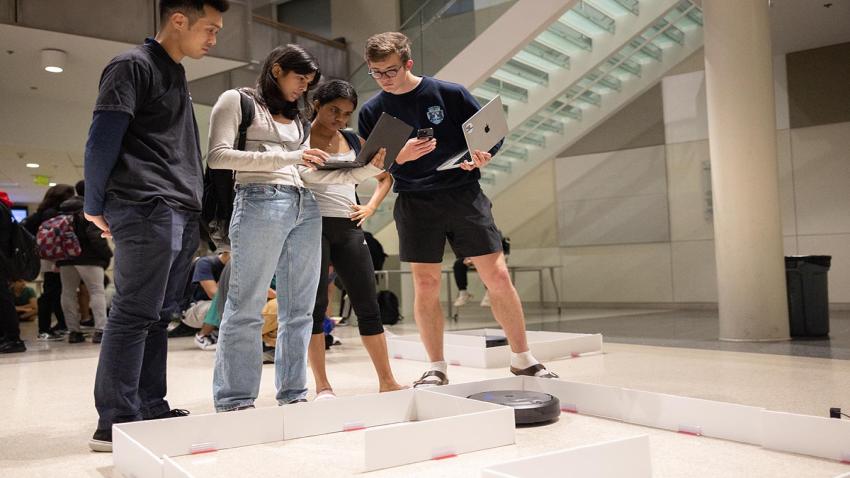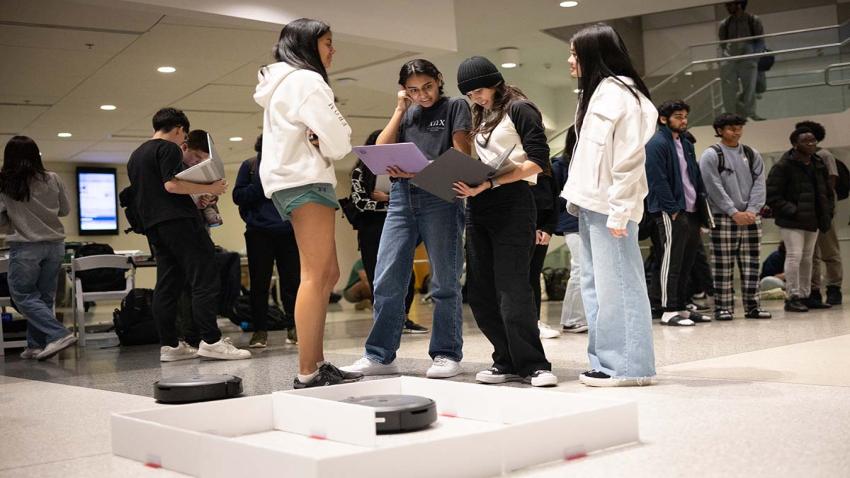
TTL Grant Provides Robots for CS Courses to Boost Student Confidence in Programming
Undergraduate students are taking their programming skills to the next level thanks to new robots in the classroom.
School of Computing Instruction (SCI) Lecturer Rodrigo Borela was one of two recent recipients of Transformative Teaching and Learning innovator grants. Borela used the grant from Georgia Tech’s Center for Teaching and Learning (CTL) to incorporate robots into his introductory CS 1301 class.
The goal is to address the common challenge of students struggling to see the direct application of coding to problem-solving. Students learned Python, a programming language, throughout the semester. They then programmed robots in lab portions of the class, allowing them to see a physical interpretation of their code.
The project culminated in a maze-navigation competition for the robots.

“This process will give them a better grasp of programming concepts while fostering teamwork and problem-solving skills to prepare them for computer science curriculum and beyond,” Borela said.
The robot must navigate the maze, avoiding obstacles with its sensors.
The goal for this hands-on approach was to build the students' confidence, enabling them to see themselves applying these techniques in various fields and encouraging them to pursue areas of STEM.
Given that students of all majors at the institute are required to take introductory level computer science (CS) courses, like Borela’s, many encountered coding and working with robots for the first time in this class.

“My high school didn’t have a robotics team, so this was my first introduction to robots. It was really interesting, and I learned a whole new skillset I would never have gained otherwise,” first-year computational media major Emma Bednarowski said.
She says she feels more comfortable possibly taking another class like this. Other students in the class say that programming the robots helped them to better grasp the material and boosted their confidence.
“Robotics is a complicated field, and there’s a lot left for me to learn, but this was an amazing introduction. Having a physical robot that you see moving around and interact with is a really cool thing,” first-year CS and math major Vishnu Mano said. “I feel like l’d be well supported if I wanted to pursue more challenging robotics classes that Georgia Tech has.”
The TTL Innovation Incubator grant program provided faculty participants with up to $8,000 to support efforts to redesign a course incorporating an experiential approach to teaching and learning.
“Fourteen faculty from five colleges engaged in a teaching innovation incubator to experiment with ways to embed and evaluate the effectiveness of experiential learning in traditional courses,” Interim Director of TTL Faculty Initiatives Kate Williams said. “A total of 850 students benefited from the engaged learning initiative.”
A second round of TTL Innovation Incubator faculty grants will launch this month. For more information about CTL grants, visit their website here.
As computing revolutionizes research in science and engineering disciplines and drives industry innovation, Georgia Tech leads the way, ranking as a top-tier destination for undergraduate computer science (CS) education. Read more about the college's commitment:… https://t.co/9e5udNwuuD pic.twitter.com/MZ6KU9gpF3
— Georgia Tech Computing (@gtcomputing) September 24, 2024


